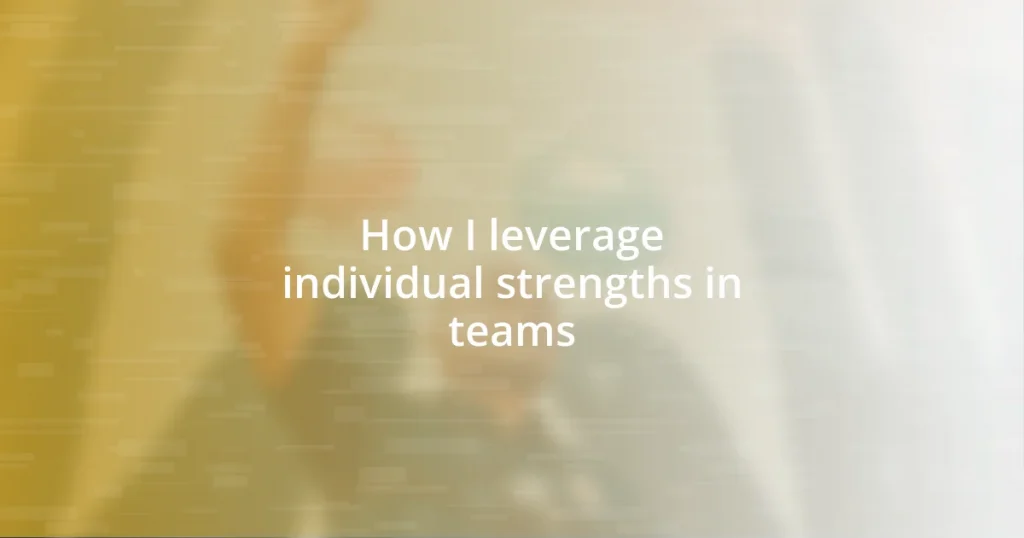Key takeaways:
- Recognizing individual strengths fosters collaboration and a sense of belonging, enhancing team dynamics and project outcomes.
- Methods like informal conversations, strength assessments, and workshops can unveil hidden talents and align roles effectively.
- Celebrating strengths, encouraging open discussions, and acknowledging contributions boosts morale, motivation, and team cohesion.
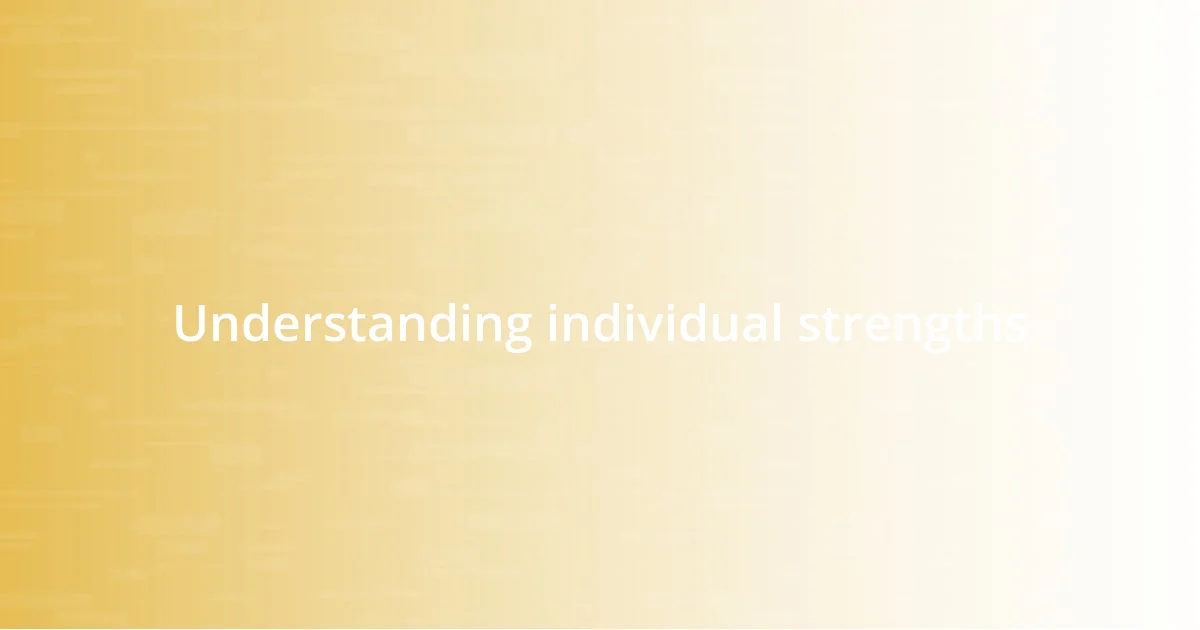
Understanding individual strengths
Understanding individual strengths begins with recognizing that everyone has a unique blend of skills and talents. In my experience, I’ve found that taking the time to genuinely discover what each team member excels at not only fosters a sense of belonging but also paves the way for better collaboration. Reflecting on it, when was the last time you felt truly valued for your unique contributions?
One memorable instance was when a colleague—a quiet thinker—surprised us with an innovative solution during a brainstorming session. It was a reminder that sometimes, individual strengths shine brightest in moments of encouragement. I often wonder how many great ideas go unheard when team dynamics overshadow individual voices.
We all have different backgrounds and experiences that shape our abilities. That diversity can be a tremendous asset when we embrace it. Personally, I’ve seen how blending my analytical skills with another teammate’s creative flair leads to outcomes none of us could achieve alone. Have you ever considered how much richer your team’s projects could be if everyone played to their strengths?
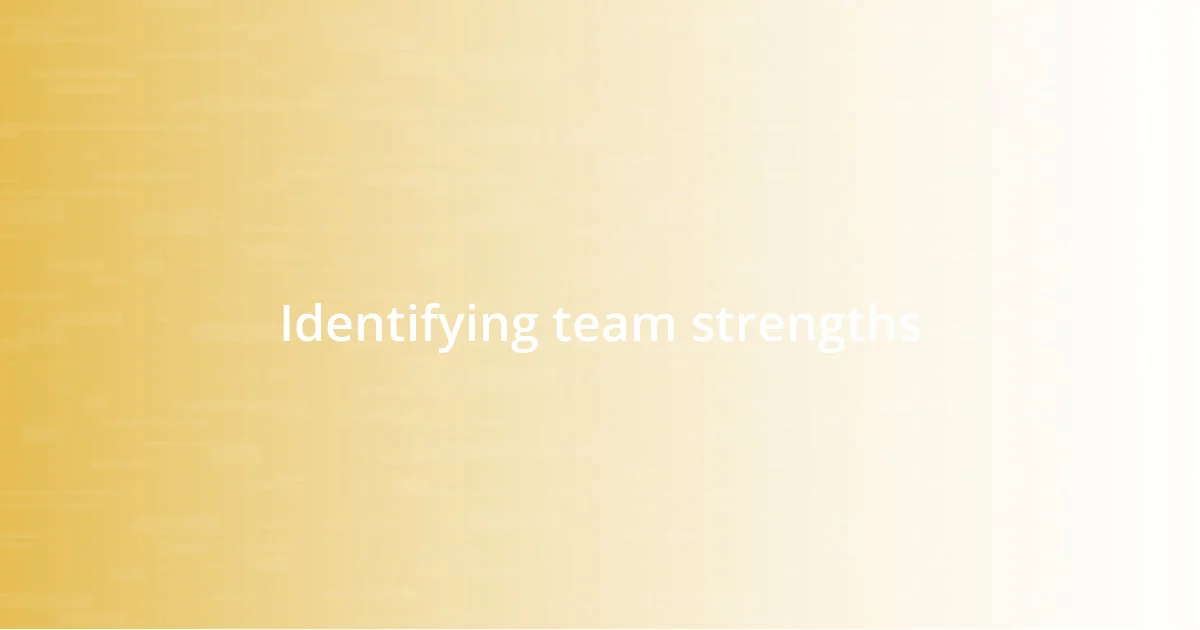
Identifying team strengths
Identifying team strengths requires a keen observation and an open mind. I’ve frequently found that informal conversations often reveal hidden talents. For example, during a casual lunch break, a teammate shared their passion for graphic design, which none of us knew about until then. This small revelation completely shifted how we approached our upcoming project presentations.
Another effective method I’ve seen is conducting strength assessments. When I first introduced a simple survey asking colleagues to list their skills and interests, the results were eye-opening. I remember a situation where someone’s technical expertise turned out to be a game-changer for our team’s efficiency. It was clear that taking the time to assess our strengths not only boosted morale but also aligned our tasks with our capabilities.
Team dynamics thrive on recognition of individual strengths. In a previous team I managed, we held a strengths mapping session. Each member detailed what they felt they excelled at and how they could contribute to team objectives. Surprisingly, one team member disclosed an aptitude for conflict resolution, which later helped us navigate a challenging phase. That experience solidified my belief that encouraging open dialogue about strengths leads to a more empowered team.
| Method | Description |
|---|---|
| Informal Conversations | Reveals hidden talents during casual interactions |
| Strength Assessments | Objective method to identify skills and interests |
| Strengths Mapping Sessions | Facilitates open discussions on individual strengths |
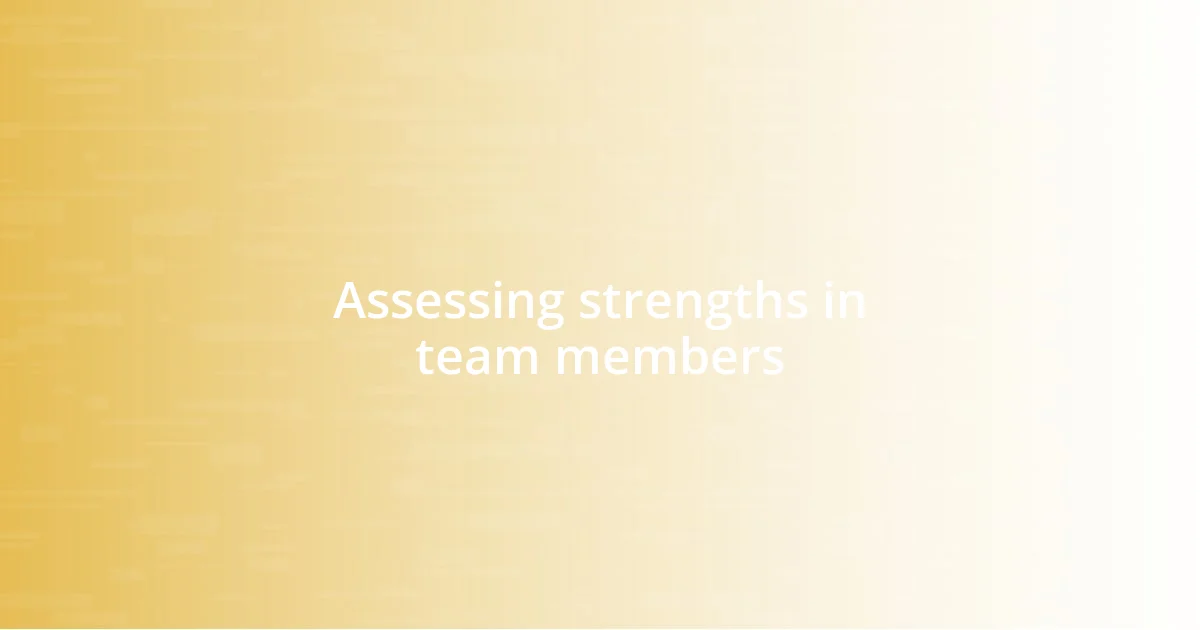
Assessing strengths in team members
Recognizing strengths in team members goes beyond traditional assessments; it’s about fostering an environment where everyone feels comfortable showcasing their abilities. I’ve noticed that when I create opportunities for individuals to speak about their expertise—be it during meetings or team-building activities—they often surprise me with insights I hadn’t considered. Just last month, a teammate shared their knack for data visualization during a casual chat. That conversation has completely transformed how we present complex information, leaving me energized by their creativity.
To effectively assess strengths, I find a mix of direct interaction and structured tools works best. Here are some methods I’ve used that have yielded great results:
- Peer Feedback: Constructive feedback from colleagues can highlight strengths that individuals may overlook in themselves.
- Skill Workshops: Organizing workshops where team members teach each other about their skills can unveil a wealth of talents.
- Team Surveys: Short surveys that ask team members to rate their skills and areas of interest provide clarity on the team’s overall capabilities.
Using these approaches, I genuinely feel that we not only harness individual strengths but also build a culture of appreciation and teamwork. It’s incredible how acknowledging these strengths creates a ripple effect, enhancing both collaboration and individual satisfaction within the team.
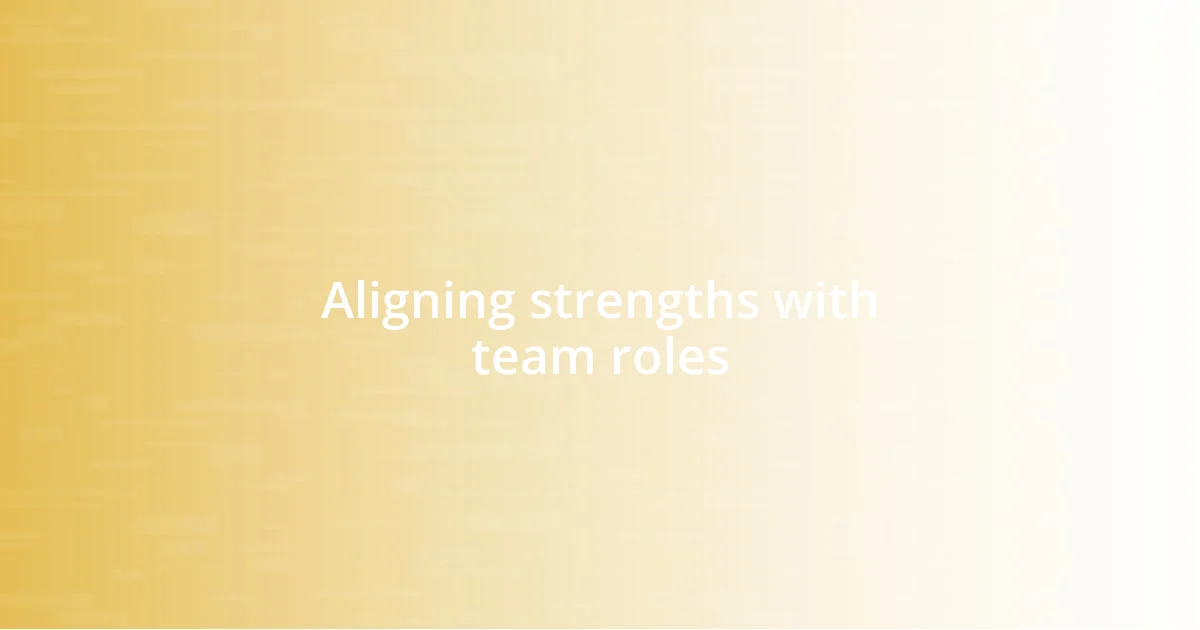
Aligning strengths with team roles
Aligning individual strengths with specific team roles is vital for overall success. I recall a project where we had a deadline looming, and I realized one teammate, who usually worked behind the scenes, had exceptional project management skills. By placing them in a coordination role, not only did their confidence skyrocket, but the project finished ahead of schedule. Isn’t it fascinating how the right fit can lead to such efficiency?
When I think about roles and strengths, the concept of “flow” comes to mind. A few months ago, during a brainstorming session, I noticed a colleague who excels in creative thinking felt stifled doing repetitive tasks. By transforming their role to focus more on innovative solutions, I could almost see the spark return in their eyes. It made me wonder—how often do we overlook the potential for brilliance simply by not aligning tasks with individual strengths?
Additionally, I’ve found that when individuals see their strengths actively utilized in their roles, it cultivates a sense of belonging. For instance, one team member with a strong analytical mindset took charge of our data analysis, and they not only thrived but inspired others to refine their own roles. It’s moments like these that underscore the importance of not just knowing strengths but actively aligning them with roles to foster growth and success. Wouldn’t you agree that recognizing these alignments can be transformative for a team’s morale and productivity?
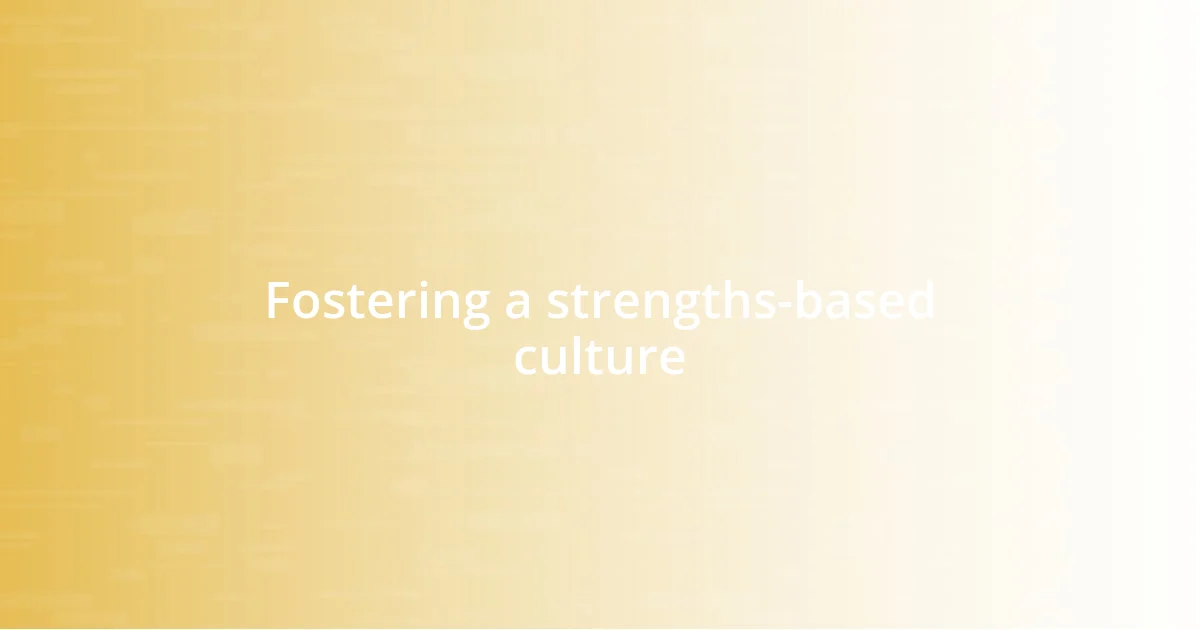
Fostering a strengths-based culture
A strengths-based culture thrives on appreciation and encouragement. I remember a time when a team member struggled with some feedback that felt overly critical. I made it a point to acknowledge not just their area for improvement but also the incredible attention to detail they always brought to their work. Suddenly, the atmosphere shifted; they started contributing more eagerly, bringing fresh perspectives that invigorated our discussions. It’s moments like this that show how celebrating individual strengths can cultivate a more inclusive and motivated team environment.
Creating a culture that prioritizes strengths means actively encouraging conversations about what individuals love to do. In one recent team huddle, I posed a simple question: “What part of your job makes you feel most energized?” The responses were enlightening! Someone mentioned their passion for mentorship, and that sparked an impromptu idea for a buddy system within our group. I found that fostering these discussions not only ignites creativity but also strengthens our connections as we share what makes us tick. Isn’t it amazing how a single question can pave the way for deeper collaboration?
Moreover, I believe that celebrating strengths should be a consistent practice, not just a one-off event. I introduced a monthly “Strengths Spotlight” during our team meetings, where we each share a success story related to a personal strength. Listening to my colleagues share their triumphs has been rewarding—it fuels enthusiasm and creates role models within our team. Honestly, the energy in the room is palpable, and it makes me realize how vital it is to cultivate a strengths-based culture that uplifts everyone. Wouldn’t you agree that such initiatives can create a sense of belonging that resonates far beyond the workplace?
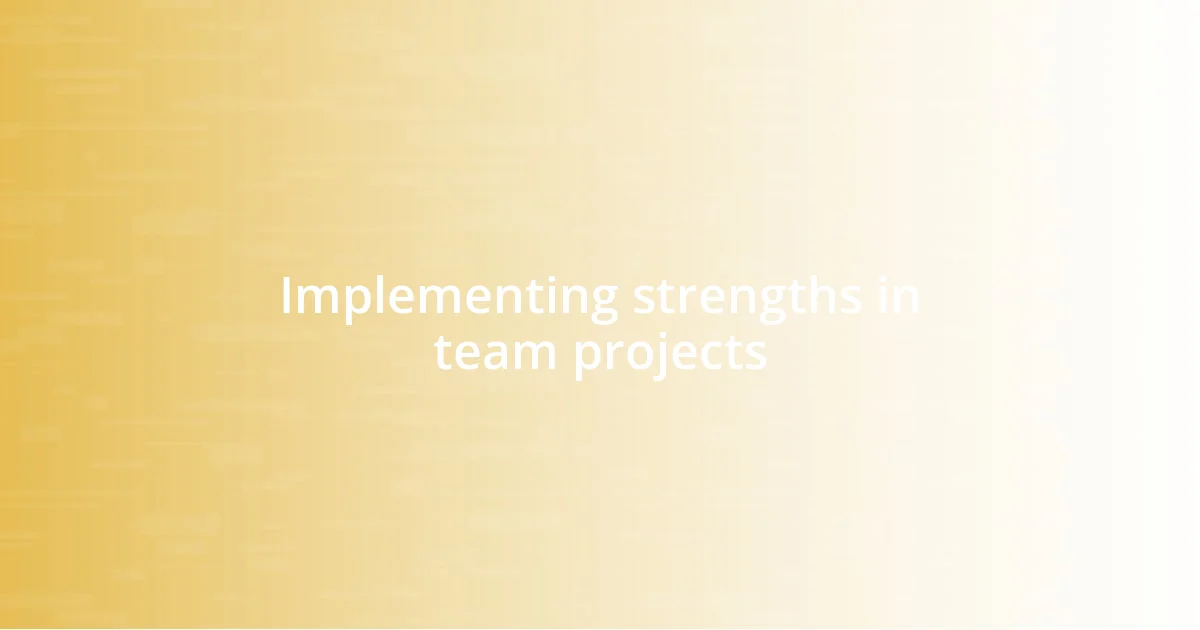
Implementing strengths in team projects
Implementing strengths in team projects can turn mundane tasks into exciting challenges. I had a moment during a complex project where we were stuck on a problem that felt insurmountable. When I encouraged a team member known for their unique problem-solving abilities to take the lead, their enthusiasm transformed the atmosphere. Not only did we find a solution quickly, but their passion for tackling tough issues inspired the whole team. Isn’t it amazing how allowing someone to shine in their strength can shift the entire dynamic?
I’ve also noticed that when we leverage strengths, communication within the team improves significantly. I remember leading a project where one colleague was particularly skilled at distilling complex information into bite-sized pieces. By assigning them to create our internal updates, everyone felt more informed and engaged. This simple shift not only made our updates clearer, but it also built trust—people began to seek their insights more often. How often do we underestimate the power of clear communication in achieving collective goals?
Finally, celebrating small victories related to individual strengths is crucial for maintaining momentum. During a recent project, I took the time to recognize a teammate for their natural ability to connect with clients. Their efforts resulted in a breakthrough that saved our timeline. This recognition didn’t just serve as encouragement; it galvanized the team, reminding us all of the value each person brings to the table. Wouldn’t you agree that acknowledging these contributions propels the whole team forward, fostering a culture of appreciation and collaboration?
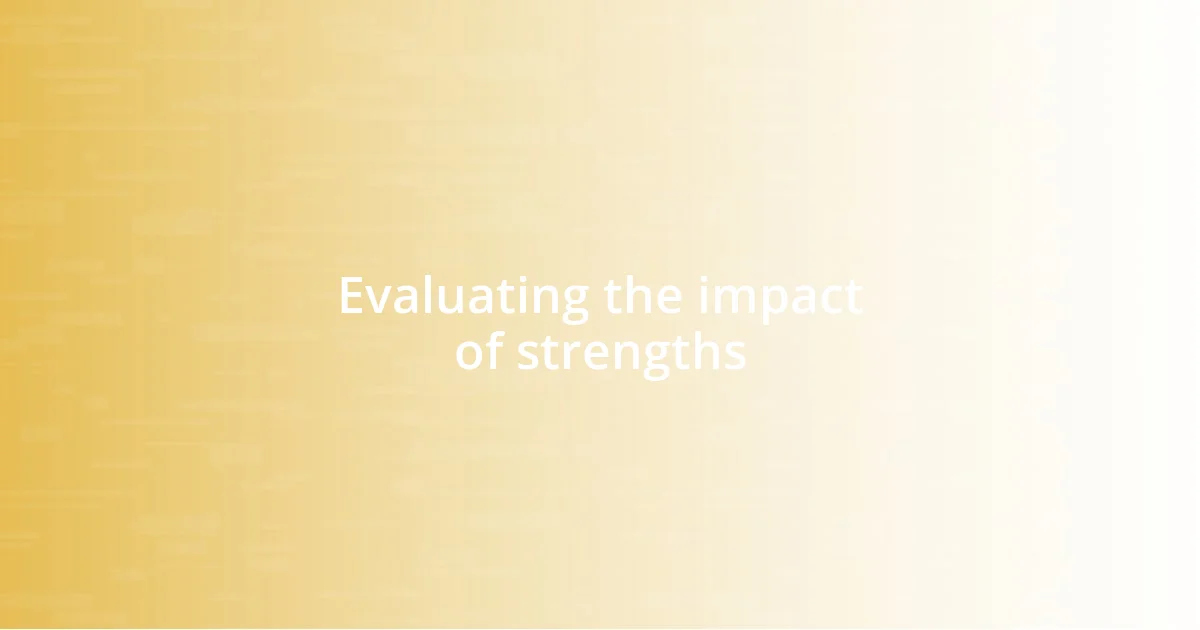
Evaluating the impact of strengths
Evaluating the impact of strengths revolves around understanding how individual contributions shape team dynamics. Recently, I found myself reflecting on a team project where one person’s enthusiasm for creative brainstorming led to innovative ideas that we never would have considered otherwise. Seeing how their passion generated excitement among others was a clear reminder of just how powerful it can be when we tap into personal strengths. Isn’t it fascinating how much stronger we become when we embrace each other’s unique talents?
In another instance, we were dissecting data for a pivotal presentation. I observed someone with a keen eye for detail taking charge; their ability to spot inconsistencies ensured our accuracy. As they led the way, I noticed colleagues rallying around them, eager to support. It struck me that when we evaluate the impact of strengths, we’re not just assessing outcomes—we’re witnessing the birth of camaraderie that stems from shared victories. Don’t you think the bonds created in these moments can transform a group into a true team?
I’ve learned that recognizing and evaluating the impact of strengths goes beyond analytics; it taps into emotional intelligence as well. For instance, during performance reviews, I make it a point to discuss specific examples of a team member’s strengths. When I shared how one person’s knack for empathy had improved our client relationships, I could literally see their confidence grow. That moment illustrated how evaluating strengths can bolster self-worth and motivate everyone to strive for excellence. How incredible is it that acknowledging someone’s strength can ripple through the entire team, enhancing morale and performance?










